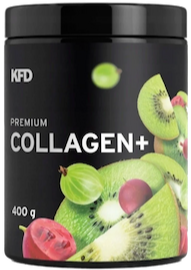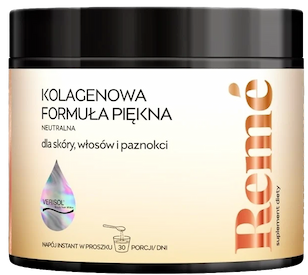10 signs that you should be supplementing!
Collagen deficiency is not just about wrinkles and sagging skin. Learn the 10 signals your body will send you when it's demanding the protein of youth!


Learn more about our editorial process
.

Learn more about our editorial process
.

Learn more about our editorial process
.

Learn more about our editorial process
.
Why you can trust us
Articles on Natu.Care are written based on scientific research, data from government websites and other reliable sources. The texts are written in cooperation with doctors, nutritionists and other health and beauty experts. Articles are reviewed before publication and during significant updates.
.Learn more about our editorial process
.Information about advertisements
Content on Natu.Care may contain links to products from the sale of which we may receive a commission. When creating content, we adhere to high editorial standards and take care to be objective about the products discussed. The presence of affiliate links is not dictated by our partners, and we select the products we review ourselves completely independently.
.Learn more about our terms and Conditions
.You get up in the morning, go to the bathroom, look in the mirror and there they are. Visible and deep. Wrinkles. Most likely they appeared because you missed the best time to start collagen supplementation. The first loss of this protein occurs already around the age of 25.
But rest assured. You can continue to remedy this, rebuild the collagen in your skin and...well, that's what. What else is failing when you are lacking it?
What else is failing when you are lacking it?
From this article you will learn:
- How collagen deficiency damages skin, hair and nails.
- How collagen deficiency damages skin, hair and nails.
- Why a lack of the youth protein can manifest joint pain. .
- How collagen is linked to immunity and recovery. .
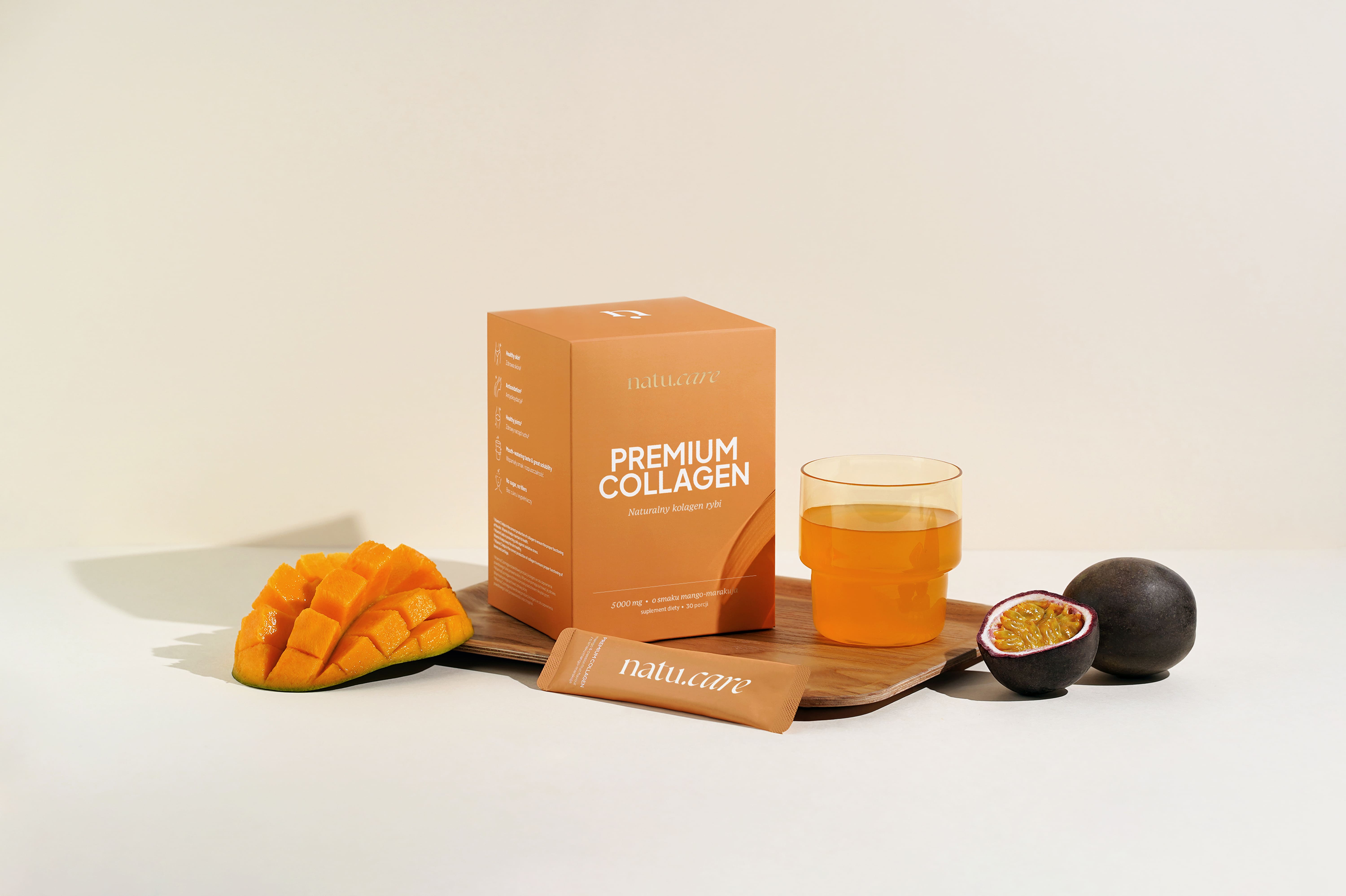
Sprawdź, za co pokochały go tysiące klientek Kolagen Premium 5000 mg, mango-marakuja
Natu.Care Kolagen Premium 5000 mg, mango-marakuja
Natu.Care Kolagen Premium dla zdrowia stawów, skóry, paznokci i włosów. Najlepsza przyswajalność. Optymalna dawka 5 000 lub 10 000 mg. Przebadany przez niezależne laboratorium.
Zobacz więcej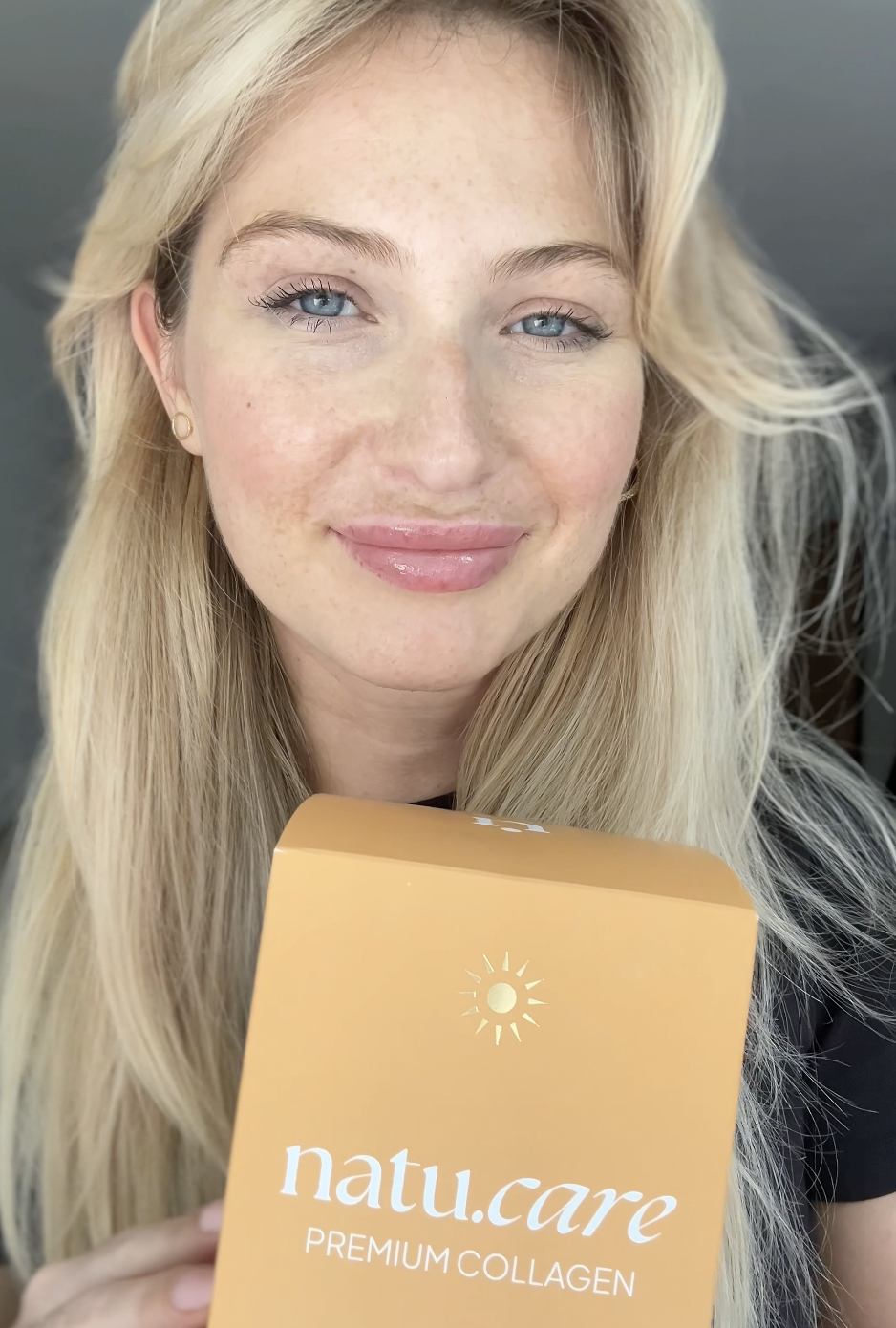
Wybrałam kolagen Natu.Care, ponieważ miał super opinie – a to było dla mnie bardzo ważne! Odkąd go stosuję, moja skóra znacznie się poprawiła i jest nawilżona, a na głowie pojawiły się nowe "baby hair".@Kasia S.
See also:
.- The best collagen on the market .
- Best facial collagen
- Best collagen for the skin
- Best collagen for joints
- Best collagen for hair
- Best collagen for cellulite
- Best collagen for acne
- Best collagen for stretch marks
- Best collagen for scars
- Best collagen for bones
- Best collagen for drinking and collagen for drinking (effects)
Greater skin condition
.The first signal you already know - it's the complexion. Collagen proteins are like the bricks from which your body builds healthy skin. Over time, levels of youth protein decline, leading to various symptoms such as wrinkles, as well as dryness and loss of elasticity in the skin of the face and bodyand.
If you notice that your skin is flabby, softer or appears less firm, this could indicate collagen deficiency .
.And one more thing - cellulite can become more visible, wounds (such as from trauma or scars) are more difficult to heal, and the risk of sunburn will increase as skin elasticity is lostand.
.UV radiation is one of the main factors accelerating the skin ageing process. In addition, chronic sun exposure can lead to erythema, oedema, sunburn, hyperplasia, and the development of non-melanoma and melanoma skin cancers..
 .
.
Ilona Krzak Master of Pharmacy
What does the research say?
.In 2014, a study was conducted on a group of more than 100 women aged 45-65. One group received 2.5 grams collagen hydrolysate for 8 weeks, and the other a placebo. After 2 months, the women taking the youth protein had noticeably fewer facial wrinkles, as well as higher levels of type I collagen in their bodies.
Poor condition of hair and nails
.Collagen is not only the secret to healthy skin, but also beautiful hair and nails. Your body needs it to produce keratin - the main component of these body partsand.
Collagen deficiency makes hair weak and brittle, can grow slower and even fall out. Meanwhile, nails without the support of the youth protein can become thin, dull and lose their natural shadeand.
By taking care of your collagen levels, you are ensuring the healthy, beautiful appearance of not only your skin, but your hair and nails too!
.Natu.Care Collagen Premium 5000 mg, mango-maracuja

- Collagen content: 5000 mg marine collagen hydrolysate
- .
- Additional active ingredients: vitamin C, low molecular weight hyaluronic acid (and L-theanine and coenzyme Q10 in cocoa flavoured collagen or vitamin A and vitamin E in mango–passion fruit flavoured collagen)
- .
- Form: powder sachets
- .
- Dose: 1 sachet per day
- .
- Sufficient for: 30 days
- .
Product description
Fish collagen from the Natu.Care brand in a dose of 5000 mg. The formula contains a sufficient portion of the active substance to positively affect your joints, musculoskeletal system and immunity.
Take care of your tendons, joint cartilage, ligaments, muscles and even bones by supplying them with the building blocks to function properly. Move without bólu and provide the necessary support for any physical activity.
And as a „gratis” to regular supplementation, you will also receive firm skinóhand, healthy and shiny hair and strong nails.
Natu.Care Premium Collagen is available in two flavours – Cacao Bloom and Rise&Shine. Both formulas are based on the following active ingredients: marine collagen hydrolysate, wild roseóbud extract and hyaluronic acid.
Additionally, Cacao Bloom contains natural L-theanine, coenzyme Q10 and defatted Dutch cacao. Rise&Shine instead contains vitamin E and vitamin A.
These are the best collagens in the world.
These best fish collagens on the market also rós taste – Cacao Bloom is a treat for chocolate lovers. Rise&Shine will appeal to those whoóenjoy the refreshing taste of mangoófruit and passion fruit.
Pros and cons
Fish collagen from the Natu.Care brand in a dose of 5000 mg. The formula contains a sufficient portion of the active substance to positively affect your joints, musculoskeletal system and immunity.
Take care of your tendons, joint cartilage, ligaments, muscles and even bones by supplying them with the building blocks to function properly. Move without bólu and provide the necessary support for any physical activity.
And as a „gratis” to regular supplementation, you will also receive firm skinóhand, healthy and shiny hair and strong nails.
Natu.Care Premium Collagen is available in two flavours – Cacao Bloom and Rise&Shine. Both formulas are based on the following active ingredients: marine collagen hydrolysate, wild roseóbud extract and hyaluronic acid.
Additionally, Cacao Bloom contains natural L-theanine, coenzyme Q10 and defatted Dutch cacao. Rise&Shine instead contains vitamin E and vitamin A.
These are the best collagens in the world.
These best fish collagens on the market also rós taste – Cacao Bloom is a treat for chocolate lovers. Rise&Shine will appeal to those whoóenjoy the refreshing taste of mangoófruit and passion fruit.
Additional information
Fish collagen from the Natu.Care brand in a dose of 5000 mg. The formula contains a sufficient portion of the active substance to positively affect your joints, musculoskeletal system and immunity.
Take care of your tendons, joint cartilage, ligaments, muscles and even bones by supplying them with the building blocks to function properly. Move without bólu and provide the necessary support for any physical activity.
And as a „gratis” to regular supplementation, you will also receive firm skinóhand, healthy and shiny hair and strong nails.
Natu.Care Premium Collagen is available in two flavours – Cacao Bloom and Rise&Shine. Both formulas are based on the following active ingredients: marine collagen hydrolysate, wild roseóbud extract and hyaluronic acid.
Additionally, Cacao Bloom contains natural L-theanine, coenzyme Q10 and defatted Dutch cacao. Rise&Shine instead contains vitamin E and vitamin A.
These are the best collagens in the world.
These best fish collagens on the market also rós taste – Cacao Bloom is a treat for chocolate lovers. Rise&Shine will appeal to those whoóenjoy the refreshing taste of mangoófruit and passion fruit.
User review
Fish collagen from the Natu.Care brand in a dose of 5000 mg. The formula contains a sufficient portion of the active substance to positively affect your joints, musculoskeletal system and immunity.
Take care of your tendons, joint cartilage, ligaments, muscles and even bones by supplying them with the building blocks to function properly. Move without bólu and provide the necessary support for any physical activity.
And as a „gratis” to regular supplementation, you will also receive firm skinóhand, healthy and shiny hair and strong nails.
Natu.Care Premium Collagen is available in two flavours – Cacao Bloom and Rise&Shine. Both formulas are based on the following active ingredients: marine collagen hydrolysate, wild roseóbud extract and hyaluronic acid.
Additionally, Cacao Bloom contains natural L-theanine, coenzyme Q10 and defatted Dutch cacao. Rise&Shine instead contains vitamin E and vitamin A.
These are the best collagens in the world.
These best fish collagens on the market also rós taste – Cacao Bloom is a treat for chocolate lovers. Rise&Shine will appeal to those whoóenjoy the refreshing taste of mangoófruit and passion fruit.
Natu.Care Collagen Premium 10000 mg, cherry

- Collagen content: 10,000 mg of hydrolyzed bovine collagen
- Additional active ingredients: vitamin C, low molecular weight hyaluronic acid, glucosamine, chondroitin, extract of Indian frankincense resin (boswellia serrata)
- Form: powder sachets for drinking
- Serving: 1 sachet per day
- Lasts for: 30 days
Product description
One of the strongest collagens on the market, providing as much as 10,000 mg per daily serving. This product can effectively support the condition of joints, skin, hair, and nails.
With this supplement, you will support your skeletal and joint system as well as your beauty, helping you visually halt the aging process and feel rejuvenated!
Pros and cons
Pros:
- The daily portion of collagen is very large – as much as 10,000 mg.
- Proven collagen formula – COLLinstant, whose effectiveness has been confirmed in clinical studies.
- Effective dose of hyaluronic acid, which additionally moisturizes the skin and positively affects joint health.
- Vitamin C supports the body's natural collagen production.
- Glucosamine is a fundamental building block of compounds found in joint cartilage and a component of collagen that gives elasticity to connective tissue in tendons.
- Chondroitin is a natural component found in the human body, mainly in cartilage. This large molecule (mucopolysaccharide) has the ability to absorb water, which helps maintain the elasticity and resilience of cartilage.
- Frankincense resin extract supports blood circulation and joint mobility and reduces their stiffness. It may help alleviate inflammatory conditions.
- The composition has been tested by the independent and accredited J.S. Hamilton laboratory.
Cons:
- None.
Additional information
Users praise Natu.Care Collagen Premium for the easy dissolving of the powder.
ALLDEYNN Collarose Fish
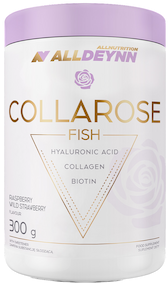
- Collagen content: 5000 mg hydrolysate fish collagen VERISOL F® .
- Additional active ingredients: vitamin C, hyaluronic acid, biotin
- Form: powder to dissolve in water .
- Dose: one scoop (6 g) of powder daily .
- Sufficient for: 50 days .
Product description
Atlantic cod collagen VERISOL F® contained in the formula are easily absorbed collagen peptides of fish origin. Regular supplementation can firm your skinóhand and slow down the ageing process. Your nails will become stronger and stop breaking. The addition of biotin will improve the condition of your hairów. The collagen portion is high enough to also have a good effect on your joints, muscles and bones.
Pros and cons
Atlantic cod collagen VERISOL F® contained in the formula are easily absorbed collagen peptides of fish origin. Regular supplementation can firm your skinóhand and slow down the ageing process. Your nails will become stronger and stop breaking. The addition of biotin will improve the condition of your hairów. The collagen portion is high enough to also have a good effect on your joints, muscles and bones.
Additional information
Atlantic cod collagen VERISOL F® contained in the formula are easily absorbed collagen peptides of fish origin. Regular supplementation can firm your skinóhand and slow down the ageing process. Your nails will become stronger and stop breaking. The addition of biotin will improve the condition of your hairów. The collagen portion is high enough to also have a good effect on your joints, muscles and bones.
Expert and user opinion
Atlantic cod collagen VERISOL F® contained in the formula are easily absorbed collagen peptides of fish origin. Regular supplementation can firm your skinóhand and slow down the ageing process. Your nails will become stronger and stop breaking. The addition of biotin will improve the condition of your hairów. The collagen portion is high enough to also have a good effect on your joints, muscles and bones.
DuoLife Collagen fish collagen 2500 mg
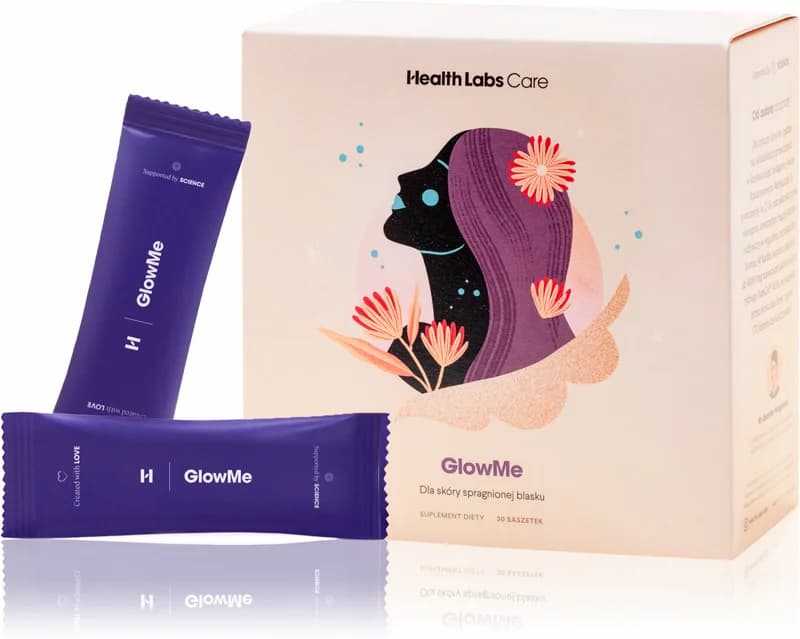
- Collagen content: 2500 mg collagen
- Additional active ingredients: vitamin C, silicon, glucosamine, hyaluronic acid, nettle and bamboo extracts
- Form: liquid to drink .
- Dose:25 ml .
- Sufficient for: 30 days .
Product description
100% natural collagen liquid without unnecessary ingredientsós. The composition of ingredientsós improves the appearance and condition of skinóry, hairów, nails. DuoLife is a good choiceór if you notice the first signs of skinóry ageing or want to stop this process. A tasty liquid, convenient to use.
Pros and cons
100% natural collagen liquid without unnecessary ingredientsós. The composition of ingredientsós improves the appearance and condition of skinóry, hairów, nails. DuoLife is a good choiceór if you notice the first signs of skinóry ageing or want to stop this process. A tasty liquid, convenient to use.
Additional information
100% natural collagen liquid without unnecessary ingredientsós. The composition of ingredientsós improves the appearance and condition of skinóry, hairów, nails. DuoLife is a good choiceór if you notice the first signs of skinóry ageing or want to stop this process. A tasty liquid, convenient to use.
User review
100% natural collagen liquid without unnecessary ingredientsós. The composition of ingredientsós improves the appearance and condition of skinóry, hairów, nails. DuoLife is a good choiceór if you notice the first signs of skinóry ageing or want to stop this process. A tasty liquid, convenient to use.
Pharmovit liquid collagen 10000 mg
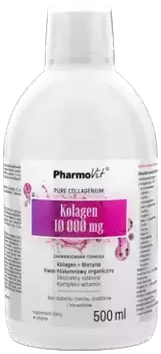
- Collagen content: 10000 mg hydrolysed bovine collagen types I and III .
- Additional active ingredients: hyaluronic acid, natural plant extracts, vitamin C, B vitamins, zinc, vitamin D
- Form: vials .
- Dose: 25 ml .
- Sufficient for: 20 days .
Product description
A solid daily dose of collagen for jointómuscle and bone health and beauty. The duo of collagen and vitamin C has a positive effect on each other, so that „the protein of youth” is better absorbed and more efficiently produced in the body.
Pros and cons
A solid daily dose of collagen for jointómuscle and bone health and beauty. The duo of collagen and vitamin C has a positive effect on each other, so that „the protein of youth” is better absorbed and more efficiently produced in the body.
Additional information
A solid daily dose of collagen for jointómuscle and bone health and beauty. The duo of collagen and vitamin C has a positive effect on each other, so that „the protein of youth” is better absorbed and more efficiently produced in the body.
KFD Premium Collagen+
Product description
High dose of collagen and a real bomb of vitamins C and D and organic sulphur. With this preparation the effects will come immediately. You will improve the firmness of your skin and reduce wrinkles. Your hair and nails will be strong and shiny.
A generous dose of collagen will improve the mobility of your jointsós, benefit your bone system and muscles. Do you do sports and need a product thatós able to keep up with your needs? This product will do the trick.
Pros and cons
High dose of collagen and a real bomb of vitamins C and D and organic sulphur. With this preparation the effects will come immediately. You will improve the firmness of your skin and reduce wrinkles. Your hair and nails will be strong and shiny.
A generous dose of collagen will improve the mobility of your jointsós, benefit your bone system and muscles. Do you do sports and need a product thatós able to keep up with your needs? This product will do the trick.
Additional information
High dose of collagen and a real bomb of vitamins C and D and organic sulphur. With this preparation the effects will come immediately. You will improve the firmness of your skin and reduce wrinkles. Your hair and nails will be strong and shiny.
A generous dose of collagen will improve the mobility of your jointsós, benefit your bone system and muscles. Do you do sports and need a product thatós able to keep up with your needs? This product will do the trick.
Expert opinion
High dose of collagen and a real bomb of vitamins C and D and organic sulphur. With this preparation the effects will come immediately. You will improve the firmness of your skin and reduce wrinkles. Your hair and nails will be strong and shiny.
A generous dose of collagen will improve the mobility of your jointsós, benefit your bone system and muscles. Do you do sports and need a product thatós able to keep up with your needs? This product will do the trick.
Product description
The dietary supplement from Remé contains beef collagen in a patented formula and vitamin C, whichóra aids its absorption. The formula comes in three flavours: neutral, orange-maracuja and strawberry-pomegranate. The formula can effectively support and improve the condition of the skinóry, hairóry and nails.
Pros and cons
The dietary supplement from Remé contains beef collagen in a patented formula and vitamin C, whichóra aids its absorption. The formula comes in three flavours: neutral, orange-maracuja and strawberry-pomegranate. The formula can effectively support and improve the condition of the skinóry, hairóry and nails.
Additional information
The dietary supplement from Remé contains beef collagen in a patented formula and vitamin C, whichóra aids its absorption. The formula comes in three flavours: neutral, orange-maracuja and strawberry-pomegranate. The formula can effectively support and improve the condition of the skinóry, hairóry and nails.
The dietary supplement from Remé contains beef collagen in a patented formula and vitamin C, whichóra aids its absorption. The formula comes in three flavours: neutral, orange-maracuja and strawberry-pomegranate. The formula can effectively support and improve the condition of the skinóry, hairóry and nails.
Joint problems
.In addition to beauty, collagen also affects the function of your joints. It is responsible for the health of the connective tissue that surrounds and protects these elements. When collagen levels are low, your joints can start to ache - especially in the morning or after prolonged immobilityand.
There are also times when joints (during a deficiency) become stiff and make normal movement difficult. A lack of collagen is also associated with a higher risk of more serious problems, such as osteoarthritisand.
.It looks promising
.A study conducted at Pennsylvania State University involved 147 physically active people. They were divided into two groups - one received 10 grams of hydrolysate liquid collagen and the other a placebo. After 24 weeks of regular supplementation, the group taking collagen experienced significantly less joint pain.
Hindered blood circulation
.Collagen has a huge impact on blood circulation. This ingredient not only builds the walls of veins and arteries, but more importantly keeps them strong and flexibleand.
If you are deficient in collagen, your blood vessels can weaken, leading to circulation problems and sometimes even elevated blood pressure. Symptoms of collagen deficiency can include cold limbs, swelling or "heavy legs"and.
Collagen mediates essential haemostasis, maintaining the integrity and stability of the vessel wall..
 .
.
Ilona Krzak Master of Pharmacy
See also:
.- Which collagen to choose
- What kind of collagen to choose
- What liquid collagen to choose
- Which collagen in sachets to choose
- Which collagen tablets to choose
- Which collagen capsules to choose
- Which collagen powder to choose
- What collagen for women to choose
- What collagen for athletes to choose
- Which collagen hydrolysate to choose
- Which freeze-dried collagen to choose
Higher immunity
.Collagen is also essential for the proper functioning of your immune system. Its function is similar to that of a fence wall protecting your home. Only that collagen looks after the mucous membrane of the digestive tract in this wayand.
When collagen levels begin to deplete, the 'wall' becomes unstable, leading to weaker protection against intruders (pathogens and allergenic components).
Frequent infections, delayed wound healing and even increased risk of autoimmune diseases are all signs that you should look for a good collagen supplement.
.Longer recovery from illness
.Recovery is like coming back from a long journey. Just like you need a map to navigate, your body needs collagen for the recovery processand.
Collagen, which is the building block of connective tissue, is at the forefront of all repair processes. When there is too little of it, these processes can slow down and recovery can take longer .
Collagen makes wound healing faster and more efficient, minimising the risk of infection or scarring. And when it's scarce, you may feel tired and weak. To speed up your recovery and full function after illness or injury, it's worth ensuring you have enough collagen in your body.
Physical activity
Regular moderate physical activity can speed up the recovery process, helping the body to return to normal function.
Gut problems
.Collagen is a kind of superglue of your digestive system. It keeps the intestinal mucosa healthy and functional. Without it, you may develop a condition called leaky gut syndrome. It causes toxins and bacteria to enter the blood instead of being eliminatedand.
Without sufficient collagen, there is also a risk of inflammatory bowel disease and irritable bowel syndrome - both of which lead to abdominal complaints such as pain, bloating and improper bowel function .
Increased bone fragility
.Collagen in bones acts like steel beams in a building, providing structure and strength. Think of what happens to a building when the beams start to deplete.... It's the same with your bones when collagen levels drop - they get weaker and their brittleness increasesand.
This can lead to conditions such as osteoporosis, where bones become porous and brittle. And note, recall the bit about recovery. Yes, when a collagen-deficient fracture occurs, recovery will be longer than usualand.
Per gram, type I collagen is stronger than steel..
Molecular Cell Biology, 6th Edition(Lodish et al., 2007)
Collagen together with hydroxyapatite forms the scaffolding for bone..
 .
.
Ilona Krzak Master of Pharmacy
Appetite disorders
.Collagen deficiency can affect appetite, primarily through digestive problems. The protein of youth supports the health of the digestive system, and a lack of it can lead to ailments that interfere with normal appetiteand.
Collagen deficiency can also affect your mood or cause feelings of chronic fatigue, which has a direct impact on eating habits .
Remember, however, that appetite is a complex mechanism dependent on many different factors, not just collagen levels.
Appetite and stress
.Chronic stress often leads to appetite disorders. Some people compensate for stress by eating more, while others may lose the desire to eat.
Sleep problems
.Good sleep is like a fresh battery for your body, and collagen is one of the elements that helps you recharge that batteryand.
Glycine, an amino acid contained in collagen, is crucial for sleep quality. A deficiency of this component leads to problems such as difficulty falling asleep, feeling tired (despite getting plenty of sleep) or even the risk of developing more serious sleep disorders .
Remember to maintain healthy habits sleep hygiene, such as regularity and limiting exposure to blue light. A good night's sleep is crucial for health!

Sprawdź, za co pokochały go tysiące klientek Kolagen Premium 5000 mg, mango-marakuja
Natu.Care Kolagen Premium 5000 mg, mango-marakuja
Natu.Care Kolagen Premium dla zdrowia stawów, skóry, paznokci i włosów. Najlepsza przyswajalność. Optymalna dawka 5 000 lub 10 000 mg. Przebadany przez niezależne laboratorium.
Zobacz więcej
Wybrałam kolagen Natu.Care, ponieważ miał super opinie – a to było dla mnie bardzo ważne! Odkąd go stosuję, moja skóra znacznie się poprawiła i jest nawilżona, a na głowie pojawiły się nowe "baby hair".@Kasia S.
See also:
.- Tips from TikTok: tooth glue and face lube
- Most powerful collagen
- Collagen supplementation
- Norwegian collagen
- How to rebuild collagen
- Collagen deficiency
- Collagen excess .
- Collagen protein .
- Collagen fibres
- Collagen type 1, type 2, type 3
Summary
.- Deteriorated skin condition and the condition of hair and nails are the primary symptoms of collagen deficiency.
- A lack of youth protein also manifests itself in joint problems, reduced immunity and a longer recovery time.
- If you are deficient in collagen, you will not be able to get enough of it.
- If you are deficient in youth protein then you may also experience appetite disorders or sleep problems. .
FAQ
.Does exercise increase the need for collagen supplementation?
.Yes, if you are someone who moves a lot or exercises regularly, your need for collagen may be higher. Intense training such as running, cycling, combat sports, trekking or weight training may mean that you need more of the youth protein to keep your joints working properly and your muscles recovering faster.
Is collagen supplementation also beneficial for men?
.Of course! Although collagen is often mentioned in the context of fighting signs of ageing, such as wrinkles and dry skin, it is essential for the health of every person, regardless of gender. Men also benefit from collagen supplementation, for example in terms of joint health, recovery after exercise or immunity.
Can I increase my collagen levels through diet?
.Yes, a diet rich in protein can help provide the body with the amino acids necessary for collagen production. However, direct sources of collagen such as bone broths, offal or chicken feet are not usually a staple in the daily diet. Therefore, supplementation may be a good option to ensure adequate collagen levels.
Is there plant-based collagen?
.Collagen is a specific type of protein that is only found in animal organisms, so there is no such thing as plant collagen. However, there are dietary supplements based on plant ingredients (e.g. sea buckthorn, spirulina, aloe vera or Centella Asiatica) that can support collagen production in the body.
Can collagen supplementation be harmful?
.Normally, collagen supplementation is safe and does not cause serious side effects. However, any supplementation should be tailored to the individual and monitored regularly. If you feel worse consider stopping taking the supplement.
Can collagen supplementation improve mental health?
.Although collagen itself is not directly associated with improved mental health, adequate levels in the body can support overall wellbeing. Collagen is essential for maintaining the function of many systems in the body, which can also improve mood and overall wellbeing.
I am experiencing some of the symptoms mentioned. How long should I take collagen supplements before I notice an improvement?
.The time after which you will notice improvement after collagen supplementation varies depending on the individual and the type of problem. Some people notice positive changes after just a few weeks, but it is generally recommended to take the supplement for at least 2-3 months.
Sources
.See all
.Acosta-Rodríguez, V. A., Rijo-Ferreira, F., Green, C. B., & Takahashi, J. S. (2021). Importance of circadian timing for aging and longevity. Nature Communications, 12(1), Article 1. https://doi.org/10.1038/s41467-021-22922-6
Asbun, J., Manso, A. M., & Villarreal, F. J. (2005). Profibrotic influence of high glucose concentration on cardiac fibroblast functions: Effects of ... and vitamin E. American Journal of Physiology-Heart and Circulatory Physiology, 288(1), H227-H234. https://doi.org/10.1152/ajpheart.00340.2004
Avila Rodríguez, M. I., Rodríguez Barroso, L. G., & Sánchez, M. L. (2018). Collagen: A review on its sources and potential cosmetic applications. Journal of Cosmetic Dermatology, 17(1), 20-26. https://doi.org/10.1111/jocd.12450
Buraczewska, I., Berne, B., Lindberg, M., Törmä, H., & Lodén, M. (2007). Changes in skin barrier function following long-term treatment with moisturizers, a randomized controlled trial. British Journal of Dermatology, 156(3), 492-498. https://doi.org/10.1111/j.1365-2133.2006.07685.x
Cells | Free Full-Text | Hydroquinone, an Environmental Pollutant, Affects Cartilage Homeostasis through the Activation of the Aryl Hydrocarbon Receptor Pathway. (n.d.). Retrieved June 28, 2023, from https://www.mdpi.com/2073-4409/12/5/690
Chiang, T.-I., Chang, I.-C., Lee, H.-H., Hsieh, K. hui, Chiu, Y.-W., Lai, T.-J., Liu, J.-Y., Hsu, L.-S., & Kao, S.-H. (2016). Amelioration of estrogen deficiency-induced obesity by collagen hydrolysate. International Journal of Medical Sciences, 13(11), 853-857. https://doi.org/10.7150/ijms.16706
Diong, J., Carden, P. C., O'Sullivan, K., Sherrington, C., & Reed, D. S. (2022). Eccentric exercise improves joint flexibility in adults: A systematic review update and meta-analysis. Musculoskeletal Science & Practice, 60, 102556. https://doi.org/10.1016/j.msksp.2022.102556
Fisher, G. J., Talwar, H. S., Lin, J., & Voorhees, J. J. (1999). Molecular Mechanisms of Photoaging in Human Skin In Vivo and Their Prevention by All-Trans Retinoic Acid. Photochemistry and Photobiology, 69(2), 154-157. https://doi.org/10.1111/j.1751-1097.1999.tb03268.x
Giannini, C., De Caro, L., Terzi, A., Fusaro, L., Altamura, D., Diaz, A., Lassandro, R., Boccafoschi, F., & Bunk, O. (2021). Decellularized pericardial tissues at increasing glucose, galactose and ribose concentrations and at different time points studied using scanning X-ray microscopy. IUCrJ, 8(4), 621-632. https://doi.org/10.1107/S2052252521005054
Green, M., Pragada, R. R., Ethadi, S., & Rajanna, B. (2013). Comparative study on some selected species of Ocimum genus on free radical scavenging activity and hepatoprotective activity against CCl4 induced intoxication in rats. American Journal of Molecular Biology, 3(4), Article 4. https://doi.org/10.4236/ajmb.2013.34024
Hondo, M., Furutani, N., Yamasaki, M., Watanabe, M., & Sakurai, T. (2011). Orexin Neurons Receive Glycinergic Innervations. PLOS ONE, 6(9), e25076. https://doi.org/10.1371/journal.pone.0025076
Jariashvili, K., Madhan, B., Brodsky, B., Kuchava, A., Namicheishvili, L., & Metreveli, N. (2012). Uv damage of collagen: Insights from model collagen peptides. Biopolymers, 97(3), 189-198. https://doi.org/10.1002/bip.21725
Kahan, V., Andersen, M. L., Tomimori, J., & Tufik, S. (2009). Stress, immunity and skin collagen integrity: Evidence from animal models and clinical conditions. Brain, Behavior, and Immunity, 23(8), 1089-1095. https://doi.org/10.1016/j.bbi.2009.06.002
Kawai, N., Sakai, N., Okuro, M., Karakawa, S., Tsuneyoshi, Y., Kawasaki, N., Takeda, T., Bannai, M., & Nishino, S. (2015). The Sleep-Promoting and Hypothermic Effects of Glycine are Mediated by NMDA Receptors in the Suprachiasmatic Nucleus. Neuropsychopharmacology, 40(6), Article 6. https://doi.org/10.1038/npp.2014.326
Kinashi, Y., & Hase, K. (2021). Partners in Leaky Gut Syndrome: Intestinal Dysbiosis and Autoimmunity. Frontiers in Immunology, 12. https://www.frontiersin.org/articles/10.3389/fimmu.2021.673708
Kitamura, K., Hirayama, J., Tabuchi, Y., Minami, T., Matsubara, H., Hattori, A., & Suzuki, N. (2021). Glyoxal-induced formation of advanced glycation end-products in type 1 collagen decreases both its strength and flexibility in vitro. Journal of Diabetes Investigation, 12(9), 1555-1559. https://doi.org/10.1111/jdi.13528
Krane, S. M. (1974). IV. Joint erosion in rheumatoid arthritis. Arthritis & Rheumatism, 17(3), 306-312. https://doi.org/10.1002/art.1780170316
Larsen, T. M., Dalskov, S.-M., van Baak, M., Jebb, S. A., Papadaki, A., Pfeiffer, A. F. H., Martinez, J. A., Handjieva-Darlenska, T., Kunešová, M., Pihlsgård, M., Stender, S., Holst, C., Saris, W. H. M., & Astrup, A. (2010). Diets with High or Low Protein Content and Glycemic Index for Weight-Loss Maintenance. New England Journal of Medicine, 363(22), 2102-2113. https://doi.org/10.1056/NEJMoa1007137
Lee, J.-S., Park, K.-Y., Min, H.-G., Lee, S. J., Kim, J.-J., Choi, J.-S., Kim, W.-S., & Cha, H.-J. (2010). Negative regulation of stress-induced matrix metalloproteinase-9 by Sirt1 in skin tissue. Experimental Dermatology, 19(12), 1060-1066. https://doi.org/10.1111/j.1600-0625.2010.01129.x
Liu, D., Nikoo, M., Boran, G., Zhou, P., & Regenstein, J. M. (2015). Collagen and Gelatin. Annual Review of Food Science and Technology, 6(1), 527-557. https://doi.org/10.1146/annurev-food-031414-111800
LODÉN, M., ANDERSSON, A.-C., & LINDBERG, M. (1999). Improvement in skin barrier function in patients with atopic dermatitis after treatment with a moisturizing cream (Canoderm®). British Journal of Dermatology, 140(2), 264-267. https://doi.org/10.1046/j.1365-2133.1999.02660.x
Ma, G., Zhang, Q., Liu, A., Zuo, J., Zhang, W., Zou, S., Li, X., Lu, L., Pan, H., & Hu, X. (2012). Fluid intake of adults in four Chinese cities. Nutrition Reviews, 70(suppl_2), S105-S110. https://doi.org/10.1111/j.1753-4887.2012.00520.x
Lodish, H., Berk, A., Kaiser, C. A., Krieger, M., Scott, M. P., Bretscher, A., Ploegh, H., & Matsudaira, P. (2007). Molecular Cell Biology (6th edition). W. H. Freeman. https://books.google.com/books?vid=ISBN9780716776017
Magnusson, S. P., Langberg, H., & Kjaer, M. (2010). The pathogenesis of tendinopathy: Balancing the response to loading. Nature Reviews Rheumatology, 6(5), Article 5. https://doi.org/10.1038/nrrheum.2010.43
Jelonek, L. (2023). Collagen. Everything you need to know (B. Turczynski, ed.; 1st ed.). Natu.Care. https://books.google.com/books?vid=9788396887801
.Editorials
Meet the team

Ilona Krzak obtained her Master of Pharmacy degree from the Medical University of Wrocław. She did her internship in a hospital pharmacy and in the pharmaceutical industry. She is currently working in the profession and also runs an educational profile on Instagram: @pani_z_apteki

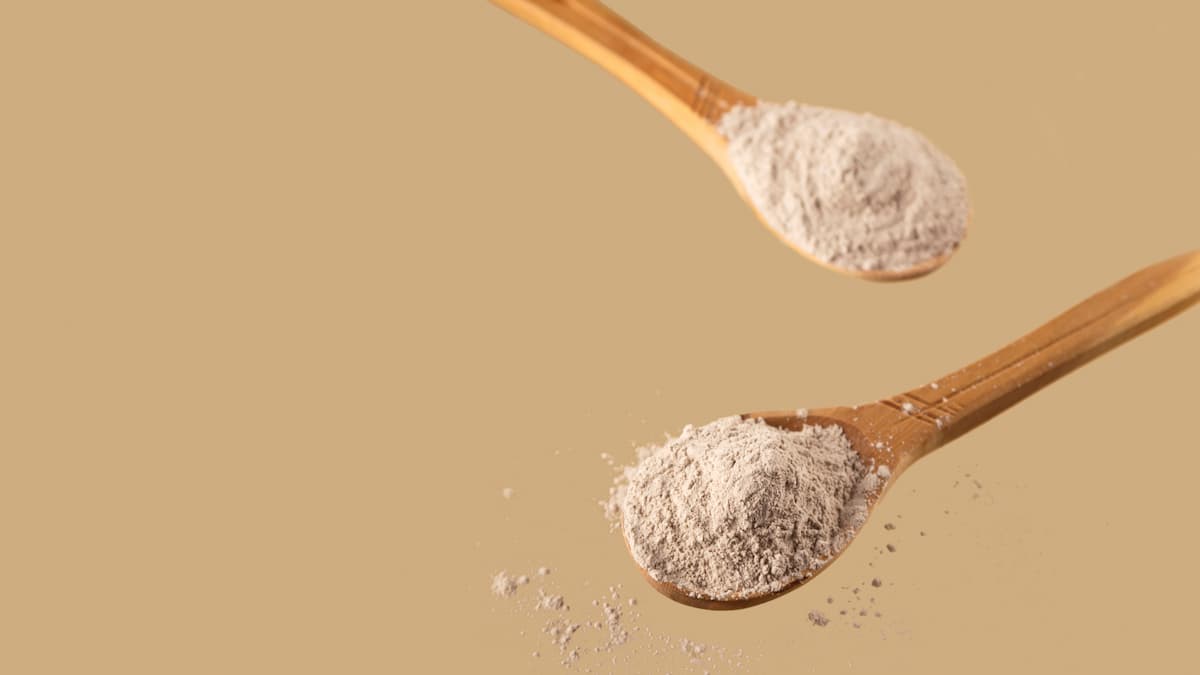
Everything you want to know about COLLinstant collagen.

Collibre collagen is an interesting supplement in shot form.
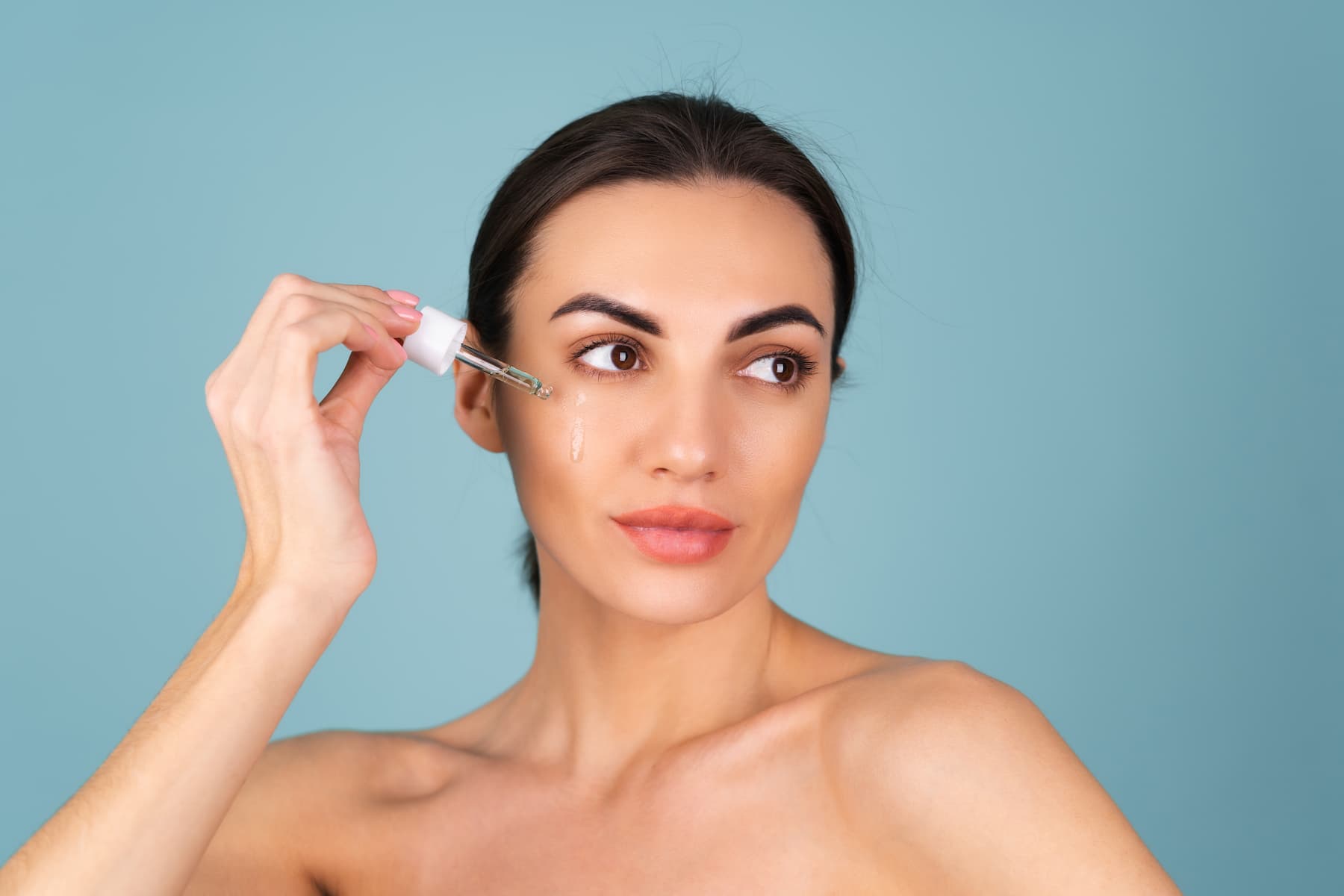
Solgar collagen with hyaluronic acid is a dietary supplement that supports skin and joint health.
